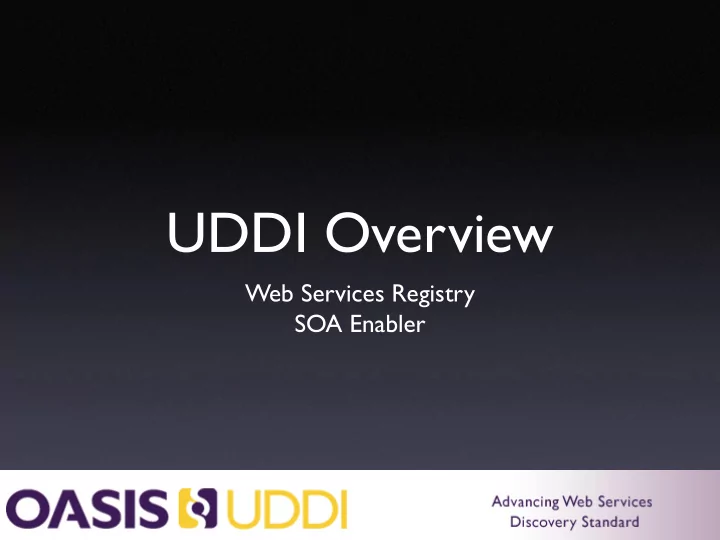

UDDI Overview Web Services Registry SOA Enabler
What Is UDDI? • Universal Description, Discovery, and Integration • Protocols for web services registry • Public implementation of standard • Part of web services stack, with SOAP , WSDL, etc.
Service-Oriented Architecture • Model of enterprise software design and integration • IT systems as flexible services, not static boxes • Network-based, loosely coupled, business-focused components • Implemented with web services standards
Why a Registry? • Structure for otherwise ad hoc process of component interactions • Location and invocation metadata for run-time binding • Flexibility for business rules: security, transport, quality of service, etc.
Typical Registry Applications • Publishing or finding web services (within an organization or across organizational boundaries) that meet arbitrary criteria • Determining the security and transport protocols supported by a given web service • Insulating applications (and providing fail-over) from failures or changes in invoked services
The UDDI Standard • UDDI specifies protocols for: • Publishing and searching services registry • Controlling access to registry • Distributing and delegatating to other registries • Managed by OASIS standards body
The Public Registry • The UDDI Business Registry (UBR): • Public reference implementation of standard • Directory of publicly available services
Key Functional Concepts • UDDI data model • businessService, businessEntity, bindingT emplate, tModels (metadata) • Hierarchy of registry instances • Nodes, registries, affiliated registries • Key programmatic interfaces • Publish, search, replicate, subscribe, key management, authentication • Multiple, flexible service taxonomies
UDDI v3 History VERSION YEAR GOALS 1.0 2000 Public registry foundation Web services alignment 2.0 2003 and extensible taxonomies Flexible and secure registry 3.0 2004 interaction models
www.uddi.org • Specification • Technical notes • Best practices • Case studies • Committee membership
OASIS • Member-led, international, non-profit standards consortium • Focuses on structured information and e-business standards • Members include users, vendors, academics, and governments • ebXML, SAML, WS-Security, BPEL, etc.
Recommend
More recommend